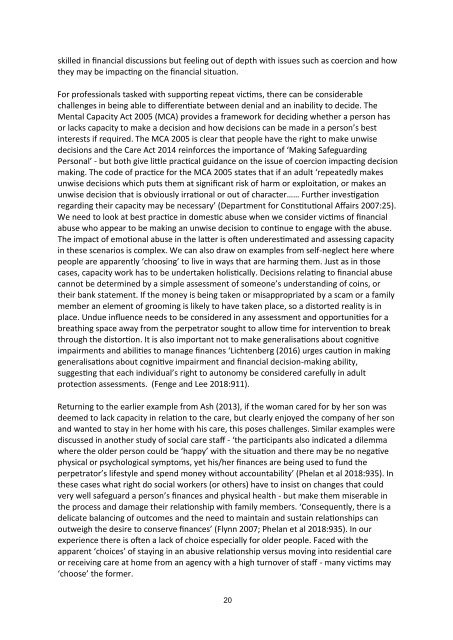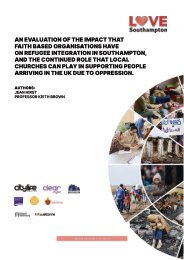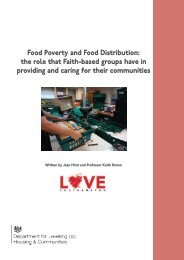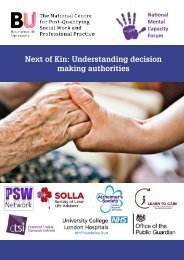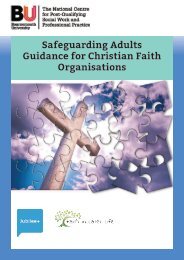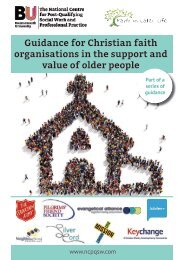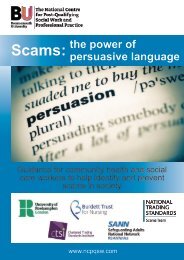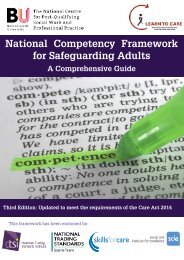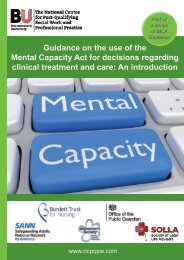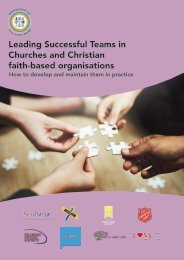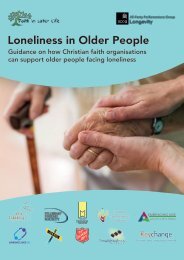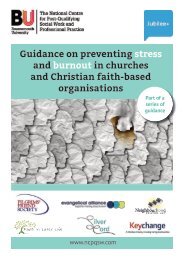0-Coercion and control report with pics FINAL
Coercion and control are used in both domestic and financial abuse. There are also differences in how agencies approach these concerns, and we seek to highlight this to learn from and utilise best practice.
Coercion and control are used in both domestic and financial abuse. There are also differences in how agencies approach these concerns, and we seek to highlight this to learn from and utilise best practice.
Create successful ePaper yourself
Turn your PDF publications into a flip-book with our unique Google optimized e-Paper software.
skilled in financial discussions but feeling out of depth <strong>with</strong> issues such as coercion <strong>and</strong> how<br />
they may be impacting on the financial situation.<br />
For professionals tasked <strong>with</strong> supporting repeat victims, there can be considerable<br />
challenges in being able to differentiate between denial <strong>and</strong> an inability to decide. The<br />
Mental Capacity Act 2005 (MCA) provides a framework for deciding whether a person has<br />
or lacks capacity to make a decision <strong>and</strong> how decisions can be made in a person’s best<br />
interests if required. The MCA 2005 is clear that people have the right to make unwise<br />
decisions <strong>and</strong> the Care Act 2014 reinforces the importance of ‘Making Safeguarding<br />
Personal’ - but both give little practical guidance on the issue of coercion impacting decision<br />
making. The code of practice for the MCA 2005 states that if an adult ‘repeatedly makes<br />
unwise decisions which puts them at significant risk of harm or exploitation, or makes an<br />
unwise decision that is obviously irrational or out of character…… Further investigation<br />
regarding their capacity may be necessary’ (Department for Constitutional Affairs 2007:25).<br />
We need to look at best practice in domestic abuse when we consider victims of financial<br />
abuse who appear to be making an unwise decision to continue to engage <strong>with</strong> the abuse.<br />
The impact of emotional abuse in the latter is often underestimated <strong>and</strong> assessing capacity<br />
in these scenarios is complex. We can also draw on examples from self-neglect here where<br />
people are apparently ‘choosing’ to live in ways that are harming them. Just as in those<br />
cases, capacity work has to be undertaken holistically. Decisions relating to financial abuse<br />
cannot be determined by a simple assessment of someone’s underst<strong>and</strong>ing of coins, or<br />
their bank statement. If the money is being taken or misappropriated by a scam or a family<br />
member an element of grooming is likely to have taken place, so a distorted reality is in<br />
place. Undue influence needs to be considered in any assessment <strong>and</strong> opportunities for a<br />
breathing space away from the perpetrator sought to allow time for intervention to break<br />
through the distortion. It is also important not to make generalisations about cognitive<br />
impairments <strong>and</strong> abilities to manage finances ‘Lichtenberg (2016) urges caution in making<br />
generalisations about cognitive impairment <strong>and</strong> financial decision-making ability,<br />
suggesting that each individual’s right to autonomy be considered carefully in adult<br />
protection assessments. (Fenge <strong>and</strong> Lee 2018:911).<br />
Returning to the earlier example from Ash (2013), if the woman cared for by her son was<br />
deemed to lack capacity in relation to the care, but clearly enjoyed the company of her son<br />
<strong>and</strong> wanted to stay in her home <strong>with</strong> his care, this poses challenges. Similar examples were<br />
discussed in another study of social care staff - ‘the participants also indicated a dilemma<br />
where the older person could be ‘happy’ <strong>with</strong> the situation <strong>and</strong> there may be no negative<br />
physical or psychological symptoms, yet his/her finances are being used to fund the<br />
perpetrator’s lifestyle <strong>and</strong> spend money <strong>with</strong>out accountability’ (Phelan et al 2018:935). In<br />
these cases what right do social workers (or others) have to insist on changes that could<br />
very well safeguard a person’s finances <strong>and</strong> physical health - but make them miserable in<br />
the process <strong>and</strong> damage their relationship <strong>with</strong> family members. ‘Consequently, there is a<br />
delicate balancing of outcomes <strong>and</strong> the need to maintain <strong>and</strong> sustain relationships can<br />
outweigh the desire to conserve finances’ (Flynn 2007; Phelan et al 2018:935). In our<br />
experience there is often a lack of choice especially for older people. Faced <strong>with</strong> the<br />
apparent ‘choices’ of staying in an abusive relationship versus moving into residential care<br />
or receiving care at home from an agency <strong>with</strong> a high turnover of staff - many victims may<br />
‘choose’ the former.<br />
20


